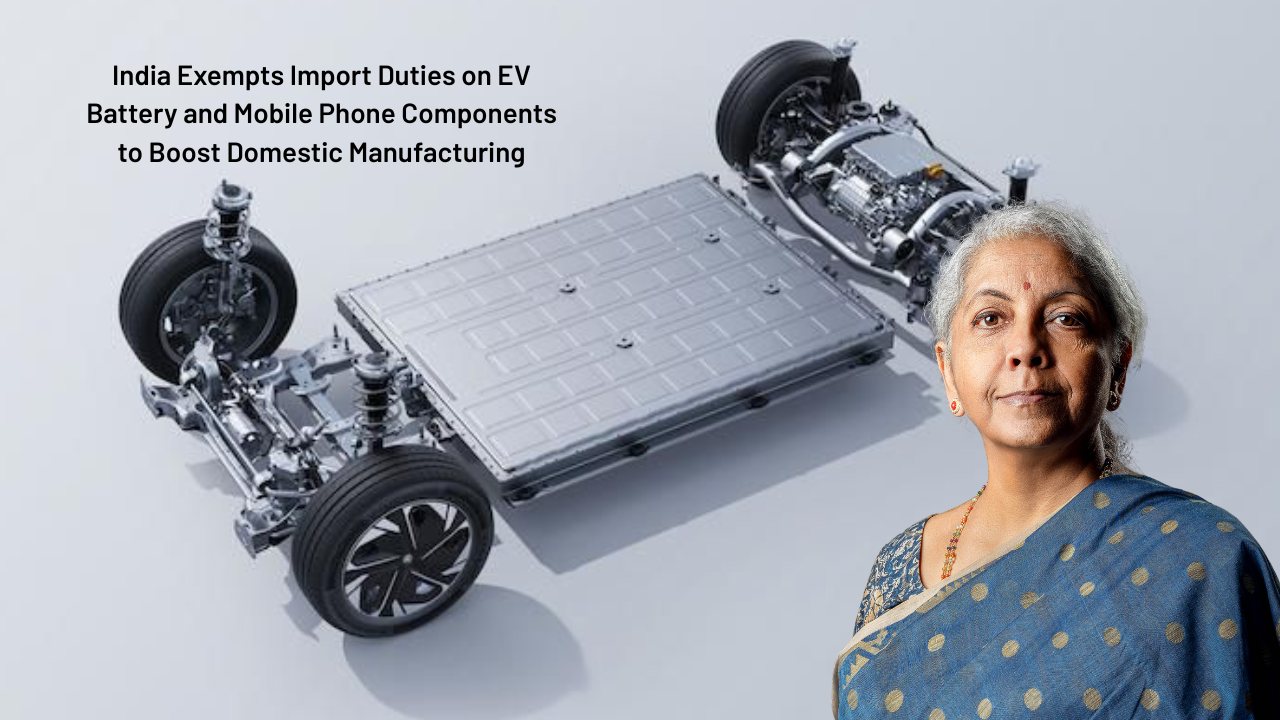New Delhi, March 25, 2025 –
In a landmark decision aimed at strengthening domestic manufacturing, the Indian government has exempted import duties on 35 essential capital goods used to produce Electric Vehicle (EV) batteries and 28 items required for mobile phone manufacturing. Finance Minister Nirmala Sitharaman announced the policy shift while presenting the Finance Bill 2025, which was passed by the Lok Sabha on Tuesday.
Objective: Boost Domestic Manufacturing and Export Competitiveness
The government’s move to eliminate import duties is aligned with India’s broader goal to boost domestic production, enhance export competitiveness, and promote self-reliance in the manufacturing of high-demand products such as EV batteries and mobile phones.
This Finance Bill 2025 relating to Customs aims to rationalize tariff structures and address duty inversion. These measures will support manufacturing units, encourage domestic value addition, facilitate trade, and provide relief to the common people, said Finance Minister Nirmala Sitharaman during her address in Parliament.
Major Impact on EV Industry: Lower Production Costs
With the rising adoption of electric vehicles in India, this decision is expected to reduce EV production costs significantly by cutting down on the price of lithium-ion batteries, which contribute nearly 40 percent of an electric vehicle’s total cost.
Key EV Battery Components Exempted from Import Duty
-
Lithium-ion battery cells
-
Electrolytes and separators
-
Battery management systems
-
Cathode and anode materials
-
Thermal insulation materials
Positive Market Response –
The EV industry responded positively to this move, with major battery manufacturers like Exide Industries and Amara Raja Energy and Mobility witnessing a surge of up to 5.1 percent in their stock prices on the Bombay Stock Exchange (BSE) the following day.
Boost for Mobile Phone Manufacturing: Strengthening India’s Smartphone Hub
India is already one of the world’s largest mobile phone manufacturing hubs, and the exemption of duties on 28 critical components used in mobile phone battery and device production is expected to further strengthen this sector.
Key Mobile Phone Components Exempted
-
Display panels and screens
-
Semiconductors and microchips
-
Camera modules and sensors
-
PCB assemblies and connectors
-
Lithium-ion batteries
The exemption is expected to make smartphone assembly and production in India more cost-efficient and globally competitive, attracting further investments from international mobile giants.
Addressing Global Trade Challenges: India Prepares for US Tariffs
The timing of the duty exemption is significant as it comes just days before the reciprocal US tariffs imposed by President Donald Trump are set to take effect from April 2, 2025.
To mitigate the impact of these tariffs and safeguard local industries, India is proactively reducing import costs on critical raw materials. A Reuters report recently suggested that India is considering slashing tariffs on over half of US imports worth 23 billion dollars as part of a bilateral trade agreement being negotiated between the two nations.
We aim to boost domestic production and enhance export competitiveness by reducing duties on raw materials, Sitharaman said during her address.
Economic Impact: Lower Costs, Higher Investments, and More Jobs
The import duty exemption is expected to drive significant economic benefits across multiple sectors. Lower input costs will reduce manufacturing expenses, leading to lower prices for consumers, while also attracting more foreign investments in local manufacturing.
Expected Outcomes
-
Lower production costs for EV and mobile manufacturers
-
Increased affordability of smartphones and EVs for Indian consumers
-
Higher competitiveness of Indian exports in global markets
-
Creation of new jobs in manufacturing and related sectors
-
Acceleration of India’s clean mobility transition
Recommendations by Parliamentary Committee: Aligning with Expert Advice
The government’s decision aligns with recent recommendations by a parliamentary committee, which advocated for a reduction in tariffs on imported raw materials to support local manufacturers. These recommendations emphasized the need to create a more favorable environment for domestic producers by lowering costs and enhancing global competitiveness.
EV and Mobile Manufacturing Ecosystem to Benefit
With zero import duties on critical EV and mobile phone components, the government is poised to create a thriving ecosystem for domestic production. The move is in line with India’s Make in India and Aatmanirbhar Bharat (self-reliant India) initiatives, which aim to reduce dependence on imports while promoting indigenous manufacturing capabilities.
A Game-Changer for Indian Manufacturing
The elimination of import duties on key components for EV batteries and mobile phones is a strategic move that positions India as a global manufacturing powerhouse. By fostering a conducive environment for innovation and production, India is paving the way for sustainable growth, technological advancement, and international trade leadership.
As India gears up to face global trade challenges head-on, this policy change is expected to strengthen local industries, attract investments, and create new economic opportunities for millions.
Parivesh Singh Gupta is the founder of TweeLabs, with over 12+ years of experience in digital marketing, SEO content writing, web development, and eCommerce solutions. He specializes in WordPress development, Meta & Google Ads, Shopify & WooCommerce, Canva-based design, and AI automation.
Parivesh helps startups and growing businesses achieve online success through high-converting strategies, powerful ad campaigns, and SEO-rich content that ranks.
For collaborations or consulting:
Email: parivesh@tweelabs.com
Website: www.tweelabs.com
Follow on LinkedIn: Parivesh Singh Gupta

